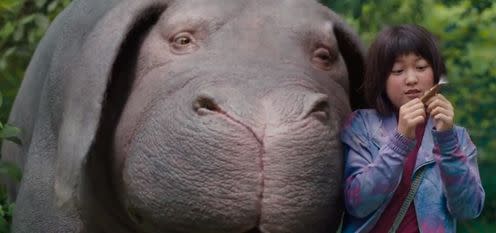Okja: a film that provides food for thought on 'sustainable' meat production

What if we could meet the challenges of the ongoing environmental crisis without changing our behaviour and practices in any way? What if, rather than revising our way of life, we could instead propose a few technical fixes that would reduce our environmental impacts while allowing us to go on living as before? Would this really settle the ethical and political questions that are posed by our current moment of climate catastrophe, mass extinction, resource scarcity and industrialised animal slaughter? These are some of the questions that are posed by Netflix’s latest original movie, Okja.
The story centres on the eponymous Okja, an animal belonging to a new species that has been genetically engineered to fulfil the developed world’s boundless appetite for meat, while minimising the environmental impact of its production. In the words of CEO Lucy Mirando (played by the always wonderful Tilda Swinton):
This beautiful and special little creature will be a revolution in the livestock industry. Our super pigs will not only be big and beautiful; they will also leave a minimal footprint on the environment, consume less feed, and produce less excretions; and most importantly – they need to taste fucking good.
The film follows Okja and her young keeper Mija as agribusiness interests compete with animal activists to decide her fate.
Okja is a timely intervention into debates about the environmental costs of meat production. For some years now, the United Nations has been suggesting that we need to cut back on meat and dairy production for the sake of the planet – and, more recently, the wildly successful activist documentary Cowspiracy brought this argument to a wider public.
As a consequence, there has been a recognition that livestock production needs to make a case for itself in terms that are more compatible with recent environmentalist thinking – often by drawing on emerging technologies to reduce environmental impact.
Recently, adjustments to cows’ gut flora were proposed as a way to cut methane emissions. More radically, new developments in tissue engineering promise to bypass the living animal altogether by growing real animal flesh through cell culture in the laboratory.
Okja deftly satirises this turn from shameless profiteering to an (at least ostensibly) ethically and environmentally responsible agribusiness. Swinton’s CEO is more Steve Jobs than Henry Ford – and her vision for agribusiness owes more to tech-industry utopianism than it does to 20th-century industrial capitalism. Having wrested control of the company from her father (who developed military technology) and her sister (whose tenure as CEO was marred by industrial-ecological catastrophe), Mirando aims to turn “the most hated agrochemical company in the world” into a seemingly beneficent force for good.
Killer question
But in creating Okja’s species as an ecologically sustainable alternative to cattle, has Mirando finally reconciled animal agriculture to its ethical and environmental obligations? Animal activists in the film – and in wider society – would strenuously disagree. It’s worth noting here that the director is sympathetic to these claims, having become vegan during the filming of Okja – and having borrowed much of the film’s visual rhetoric from footage taken by undercover activist documentarians. In order to settle this question, we need to more carefully explore how sustainability functions as an ethical and political ideal.
Sustainability is a deeply ambivalent concept. On the one hand, it names a broad desire to take more responsibility for our impact on the planet – and this is clearly a good thing. On the other hand, unless it is directed by an ethical analysis which isn’t easily reduced to technical tinkering, it can quickly become a kind of cynical calculation. In this context, consider the strange paradox of new, more sustainable fishing practices: we save species from extinction in order to better kill them in the future.
The shift to thinking about the sustainability of meat production in merely technical terms (“how should we reduce emissions?”) entirely bypasses the question of animal ethics. Instead of asking “should we kill?”, we find ourselves asking “how should we kill with maximum efficiency?” By translating an ethical question into a technical one, this model of sustainability lets animal agriculture off the hook for the violence that it does.
Okja pushes back against this by foregrounding the relationship between a little girl and her animal friend. So, yes, Okja is a well-engineered beast who contributes to lower environmental impact, but she’s also an individual animal who loves and is loved – and she has an ethically significant interest in her own well-being.
As Okja and Cowspiracy make clear, the technical debate into the environmental impact of eating meat is critically important. But even if animal agribusiness could be made thoroughly sustainable, routine practices of confinement, forcible reproduction and slaughter remain highly ethically questionable.
This article was originally published on The Conversation. Read the original article.

Seán McCorry is a co-founder of the Sheffield Animals Research Centre, and a member of the Vegan Society's Research Advisory Committee.

 Yahoo News
Yahoo News 